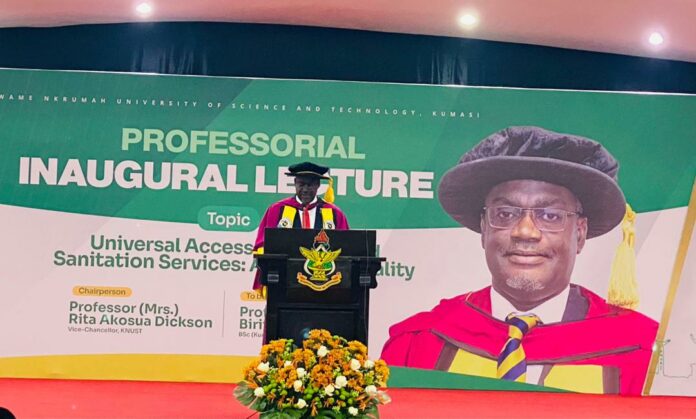With just 6 years to 2030, Ghana’s efforts to achieve the Sustainable Development Goals 6.1 and 6.2 which ensures universal access to water and sanitation by 2030 is considered a mirage.
According to the 2022 report of the Ghana Statistical Service, 1.4 million Ghanaians depend on surface water with only 37% of the population (12.5 million Ghanaians) using sachet water while 56% of the population have access to improved water supply.
In the area of sanitation, 8 million people are reported to use public toilets in Ghana with 11 million people sharing toilets with neighbors while open defecation has increased from 3.4m to 5.7m.
In view of these figures supported by his extensive research in water and sanitation, Prof. Kwabena Biritwum Nyarko during his professorial inaugural lecture on the topic “Universal Access to Water and Sanitation Services: A Myth or Reality?” at the Kwame Nkrumah University of Science and Technology called on government to invest in water and sanitation to ensure universal access.

“Globally, poor access to water and sanitation results in approximately 1.7 billion cases of gastrointestinal diseases, especially in children under five years each year, with over 700,000 annual fatalities.
Ghana has made significant progress over the past decades because by 2022, 88% of Ghanaians had access to at least basic water services, up from 56% in 1990, and for sanitation, 29% had access to basic services, up from 7% in 1990.
But Ghana still faces substantial challenges in achieving its policy commitments on water and sanitation. These improvements highlight, however, have been limited by a number of persistent challenges, which have been exacerbated by population growth, urbanization, and climate change.
There are also significant disparities in access that also underscore the gap between Ghana’s SDGs 6.1 and 6.2 commitments and the current reality.
“The main challenges are expanding access to the unserved population without water and sanitation services; a task which becomes more complex due to the need for enhanced sustainability of systems as service delivery approaches full coverage.
To address these challenges, the government should invest in research, development, and innovation to generate solutions to address the water and sanitation challenges in areas including financing, technology options, institutional design, and marketing to ensure effective implementation and sustainability,” Prof. Kwabena Nyarko said.
He bemoaned the health risk of untreated grey water.
“60% of the population dispose their grey water by throwing it on the ground or on the streets, 27% dispose theirs by allowing it to follow into the gutters, 11% dispose theirs by challenging them into soaked pits (soak-away) while only 2% dispose their grey water through proper sewage systems.
This confirms that majority of grey water in the country are not treated or properly disposed mainly because of lack of treatment systems, and this possess a major health risk since grey water is polluting and contains micro pollutants at levels higher than expected and requests treatment before disposal.
Untreated grey water remains polluted and presents substantial environmental risks in Ghana and makes it difficult to ensure a universal access to sanitation. Grey water management is a serious concern and demands attention from stakeholders especially in a situation where less than 5% of Ghana’s population had access to sewage systems, “he said.
To address these challenges, Prof. Kwabena Nyarko proposes an urgent need by government and other agencies to ensure the sustainability of water and sanitation services.
“A strong government commitment is essential to expanding water and sanitation access for all in a sustainable, efficient, and equitable manner. As part of the Liquid Waste Management Strategy, the Ministry of Sanitation and Water Resources should develop a national framework for Greywater Management to guide the MMDAs on greywater collection, treatment, and disposal.
A comprehensive assessment of the overall water supply landscape for urban areas, small towns, and rural communities is necessary to determine the best service management arrangements based on economies of scale, efficiency improvements and regulatory enhancements and to provide sustainable water and sanitation services, it is imperative to address the high rates of non-functional water and sanitation infrastructure, including those in institutions, which stem from inadequate planning, budgeting and expenditure on operations and maintenance.
“To address the problem of untreated and unsafe disposal of faecal sludge, a national Liquid Waste Management Strategy that incorporates a Faecal Sludge Management (FSM) Program is warranted.
In implementing the framework, the MSWR should develop a program with a clear regulatory framework, including specific regulations and standards for the safe collection, transportation, treatment, and disposal of faecal sludge to provide guidance to the MMDAs,” he proposed.
Issah Zakariah/Akoma Fm/3news.com












